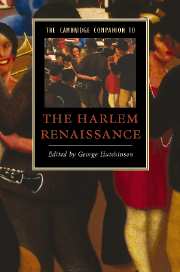Book contents
- Frontmatter
- Introduction
- Part I: Foundations of The Harlem Renaissance
- Part II: Major Authors and Texts
- 4 Negro drama and the Harlem Renaissance
- 5 Jean Toomer and the avant-garde
- 6 “To tell the truth about us”: the fictions and non-fictions of Jessie Fauset and Walter White
- 7 African American folk roots and Harlem Renaissance poetry
- 8 Lyric stars: Countee Cullen and Langston Hughes
- 9 “Perhaps Buddha is a woman”: women’s poetry in the Harlem Renaissance
- 10 Transgressive sexuality and the literature of the Harlem Renaissance
- 11 Sexual desire, modernity, and modernism in the fiction of Nella Larsen and Rudolph Fisher
- 12 Banjo meets the Dark Princess: Claude McKay, W. E. B. Du Bois, and the transnational novel of the Harlem Renaissance
- 13 The Caribbean voices of Claude McKay and Eric Walrond
- 14 George Schuyler and Wallace Thurman: two satirists of the Harlem Renaissance
- 15 Zora Neale Hurston, folk performance, and the “Margarine Negro”
- Part III: The Post-Renaissance
- Further Reading
- Index
7 - African American folk roots and Harlem Renaissance poetry
from Part II: - Major Authors and Texts
Published online by Cambridge University Press: 28 July 2007
- Frontmatter
- Introduction
- Part I: Foundations of The Harlem Renaissance
- Part II: Major Authors and Texts
- 4 Negro drama and the Harlem Renaissance
- 5 Jean Toomer and the avant-garde
- 6 “To tell the truth about us”: the fictions and non-fictions of Jessie Fauset and Walter White
- 7 African American folk roots and Harlem Renaissance poetry
- 8 Lyric stars: Countee Cullen and Langston Hughes
- 9 “Perhaps Buddha is a woman”: women’s poetry in the Harlem Renaissance
- 10 Transgressive sexuality and the literature of the Harlem Renaissance
- 11 Sexual desire, modernity, and modernism in the fiction of Nella Larsen and Rudolph Fisher
- 12 Banjo meets the Dark Princess: Claude McKay, W. E. B. Du Bois, and the transnational novel of the Harlem Renaissance
- 13 The Caribbean voices of Claude McKay and Eric Walrond
- 14 George Schuyler and Wallace Thurman: two satirists of the Harlem Renaissance
- 15 Zora Neale Hurston, folk performance, and the “Margarine Negro”
- Part III: The Post-Renaissance
- Further Reading
- Index
Summary
Our contemporary celebration of African American culture, especially our concern for “authentic” blackness and the vernacular, owes much to the New Negro era. From Hip Hop, to movies depicting black inner city life, to spokenword poetry, to “Chitlin' Circuit” theater, and beyond, black folk expression (either rural or urban) has come to serve as the sign of black cultural identity. Yet the centrality of the vernacular was not always evident in the longer history of African American letters. To be sure, the vernacular has always held a place in African American literary expression, but through the eighteenth and nineteenth centuries standard English and Anglo-American literary models were the norm (indeed the ideal for many) in addressing both African American and white audiences. It was the Harlem Renaissance that radically relocated the folk, indeed reinvented an African American literary vocabulary based on folk forms, idioms, and patterns of speech; and in doing so, the Harlem Renaissance bequeathed a legacy that would shape African American literature throughout the twentieth century and up to the present day.
The legacy of Harlem Renaissance artistry begins in the larger context of the New Negro Movement, the late nineteenth-, early twentieth-century political and cultural movement to reclaim the civil rights guaranteed through Reconstruction legislation. The New Negro generation created political organizations, published magazines and newspapers, attended colleges and universities in unprecedented numbers, and pursued professional careers all in the name of African American equality, inclusion, and full citizenship.
- Type
- Chapter
- Information
- The Cambridge Companion to the Harlem Renaissance , pp. 96 - 111Publisher: Cambridge University PressPrint publication year: 2007
- 2
- Cited by



